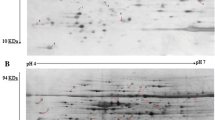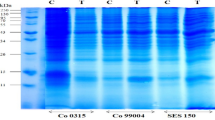Abstract
Rice is one of the widely consumed staple foods among the world’s human population. Its production is adversely affected by high temperature and is more pronounced at flowering stage. Elucidating elevated temperature stress-related proteins as well as associated mechanisms is inevitable for improving heat tolerance in rice. In the present study, a proteomic analysis of heat-sensitive rice genotype, IET 21405 was conducted. Two-dimensional electrophoresis (2-DE) and MALDI-TOF/MS-based proteomics approaches revealed a total of 73 protein spots in rice leaf. The protein profiles clearly indicated variations in protein expression between the control and heat treated rice genotypes. Functional assessment of 73 expressed proteins revealed several mechanisms thought to be involved in high temperature including their putative role in metabolism, energy, protein synthesis, protein transport/storage, etc. Besides these, some proteins are expected to involve in photosynthesis, tricarboxylic acid (TCA) cycle, glycolysis and other proteins for energy production. The proteins identified in the present study provide a strong basis to elucidate gene function of these proteins and to explain further the molecular mechanisms underlying the adaptation of rice to high temperature stress.



Similar content being viewed by others
References
Cho J, Oki T (2012) Application of temperature, water stress, CO2in rice growth models. Rice 5:10. doi:10.1186/1939-8433-5-10
Dutta S, Mohanty S, Tripathy BC (2009) Role of temperature stress on chloroplast biogenesis and protein import in Pea. Plant Physiol 150:1050–1061
Han F, Chen H, Li XJ, Yang MF, Liu GS, Shen SH (2009) A comparative proteomic analysis of rice seedlings under various high-temperature stresses. Biochim Biophys Acta 1794:1625–1634
Hasanuzzaman M, Nahar K, Alam MM, Roychowdhury R, Fujita M (2013) Physiological, biochemical, and molecular mechanisms of heat stress tolerance in plants. Int J Mol Sci 14:9643–9684
Huang B, Rachmilevitch S, Xu J (2012) Root carbon and protein metabolism associated with heat tolerance. J Exp Bot 63:3455–3465
IPCC (2014) Climate Change 2014: Synthesis Report. In: Pachauri RK, Meyer LA (eds) Contribution of Working Groups I, II and III to the Fifth Assessment Report of the Intergovernmental Panel on Climate Change IPCC, Geneva, Switzerland, p 151
Kaneko K, Sasaki M, Kuribayashi N, Suzuki H, Sasuga Y, Shiraya T, Inomata T, Itoh K, Baslam M, Mitsui T (2016) Proteomic and glycomic characterization of rice chalky grains produced under moderate and high-temperature conditions in field system. Rice 9:26. doi:10.1186/s12284-016-0100-y
Kim M, Kim H, Lee W, Lee Y, Kwon S, Lee Joohyun (2015) Quantitative shotgun proteomics analysis of rice anther proteins after exposure to high temperature. Int J Genom 2015:238704. doi:10.1155/2015/238704
Klose J (2009) From 2-D electrophoresis to proteomics. Electrophoresis 30:142–149
Kumar N, Kumar N, Shukla A, Shankhdhar SC, Shankhdhar D (2015) Impact of terminal heat stress on pollen viability and yield attributes of rice (Oryza sativa L.). Cereal Res Commun. doi:10.1556/0806.43.2015.023
Lee R, Hsu JH, Huang HJ, Lo FS, Chen SCG (2009) Alkaline α-galactosidase degrades thylakoid membranes in the chloroplast during leaf senescence in rice. New Phytol 84:596–606
Li H, Chen Z, Hu M, Wang Z, Hua H, Yin C, Zeng H (2011) Different effects of night versus day high temperature on rice quality and accumulation profiling of rice grain proteins during grain filling. Plant Cell Rep 30:1641–1659
Li H, Cail J, Jiang D, Liu F, Dai T, Cao W (2013) Carbohydrates accumulation and remobilization in wheat plants as influenced by combined water logging and shading stress during grain filling. J Agron Crop Sci 199:38–48
Liao JL, Zhang HY, Liu JB, Zhong PA, Huang YJ (2012) Identification of candidate genes related to rice grain weight under high-temperature stress. Plant Sci 196:32–43
Mittal D, Madhyastha DA, Grover A (2012) Gene expression analysis in response to low and high temperature and oxidative stresses in rice: combination of stresses evokes different transcriptional changes as against stresses applied individually. Plant Sci 197:102–113
Natarajan S, Kuehny JS (2008) Morphological, physiological, and anatomical characteristics associated with heat preconditioning and heat tolerance in Salvia splendens. J Am Soc Hortic Sci 133:527–534
Neilson KA, Gammulla CG, Mirzaei M, Imin N, Haynes PA (2010) Proteomic analysis of temperature stress in plants. Proteomics 10:828–845
Rang ZW, Jagadish SVK, Zhou QM, Craufurd PQ, Heuer S (2011) Effect of high temperature and water stress on pollen germination and spikelet fertility in rice. Environ Exp Bot 70:58–65
Reza MIH, Chowdhury AQ, Pasha MK (2005) Characterization of proteins of brown, bran and endosperm of raw and parboiled rice. Res J Agric Biol Sci 1:184–189
Scafaro AP, Haynes PA, Atwell BJ (2010) Physiological and molecular changes in Oryza meridionalis Ng., a heat-tolerant species of wild rice. J Exp Bot 61:191–202
Singh A, Singh U, Mittal D, Grover A (2010) Genome-wide analysis of rice ClpB/HSP100, ClpC and ClpD genes. Genomics 11:2–18
Suyal DC, Yadav A, Shouche Y, Goel R (2014) Differential proteomics in response to low temperature diazotrophy of himalayan psychrophilic nitrogen fixing Pseudomonas migulae S10724 strain. Curr Microbiol 68:543–550
Timperio A, Egidi M, Zolla L (2008) Proteomics applied on plant abiotic stresses: role of heat shock proteins (HSP). J Proteom 71:391–411
Wang W, Vinocur B, Shoseyov O, Altman A (2004) Role of plant heat- hock proteins and molecular chaperones in the abiotic stress response. Trends Plant Sci 9:244–252
Zhang Y, Mian MA, Chekhovskiy K, So S, Kupfer D, Lai H, Roe BA (2005) Differential gene expression in Festuca under heat stress conditions. J Exp Bot 56:897–907
Zhong LJ, Dong H, Cai XB, Feng YN, Ren P, Cheng FM (2012) Gene expression of the key enzymes controlling starch synthesis and metabolism in rice grain endosperm under effects of high temperature after anthesis. Ying Yong Sheng Tai Xue Bao 23:745–750
Zhou J, Zhang Y, Qi J, Chi Y, Fan B, Yu JQ, Chen Z (2014) E3 ubiquitin ligase chip and NBR1-mediated selective autophagy protect additively against proteotoxicity in plant stress responses. PLoS Genet 10:e1004116. doi:10.1371/journal.pgen.1004116
Zhu Y, Zhu G, Guo Q, Zhu Z, Wang C, Liu Z (2013) A comparative proteomic analysis of Pinellia ternata leaves exposed to heat stress. Int J Mol Sci 14:20614–20634
Acknowledgements
Authors impart sincere thanks to Directorate of Rice Research (ICAR), Hyderabad, India for providing financial support under AICRIP.
Author information
Authors and Affiliations
Corresponding author
Rights and permissions
About this article
Cite this article
Kumar, N., Suyal, D.C., Sharma, I.P. et al. Elucidating stress proteins in rice (Oryza sativa L.) genotype under elevated temperature: a proteomic approach to understand heat stress response. 3 Biotech 7, 205 (2017). https://doi.org/10.1007/s13205-017-0856-9
Received:
Accepted:
Published:
DOI: https://doi.org/10.1007/s13205-017-0856-9




